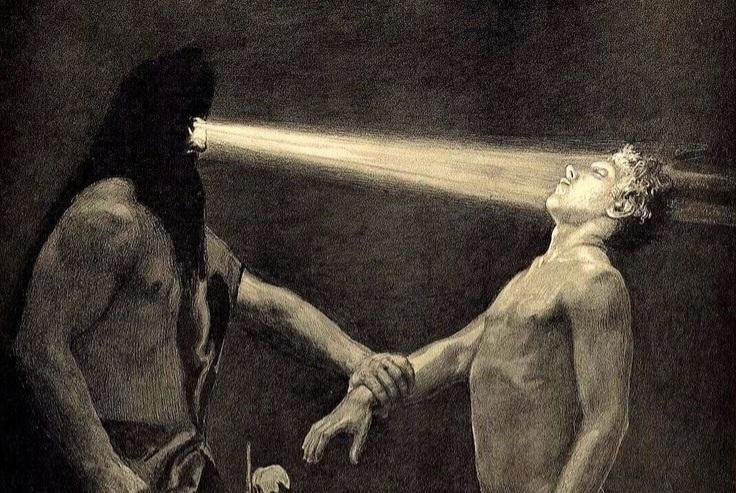As Prometheus, having stolen fire from heaven, begins to build houses and to settle upon the earth, so philosophy, expanded to be the whole world, turns against the world of appearance.Karl Marx, ‘Notebooks on Epicurean Philosophy’ (1839).
1. Oxford Languages defines “Science” as “the systematic study of the structure and behavior of the physical and natural world through observation, experimentation, and the testing of theories against the evidence obtained.”
2. The scientific method presupposes that reality can be exhaustively understood through the systematic observation of discrete empirical facts and the inferential generalization of these facts into universal laws. The legitimacy of knowledge is tied to the verification and falsification of propositions by reference to observable states of affairs. The scientific enterprise is thus a positivist enterprise, which, to sum, is the progressive accumulation of verified statements about the empirical world.
3. At its core, positivism rests on the assumption that observation is the epistemically privileged access to reality. The givenness of empirical data is taken as ontologically primary and self-sufficient. Facts are raw, unmediated, and independent of theory. Positivist method privileges quantification and sensory observation as final arbiters of truth. Concepts and theoretical objects are legitimate only insofar as they are practicable and directly linked to observable indicators.
4. Positivism, in its Enlightenment origin, treats empirical facts as self-transparent data from which natural universal laws can be induced and/or verified. Its epistemology presupposes a subject standing over and against an object whose structure can be observed without the subject’s own social mediation. But this stance is already abstracted from the historical social relations that produce both the “observer” and the “phenomena”. Positivism’s claim to neutrality and scientific objectivity then consequently negates the real constitution of its objects and collapses the particularity of the natural world into simple abstractions/categories, what Adorno calls “identity-thinking”. The more faithfully positivism adheres to empirical immediacy, the more completely it fetishizes historically specific social forms as natural ones independent of man’s historicized consciousness.
5. Whereas positivism abstracts by isolating variables and controlling for confounders to infer causal effects under ceteris-paribus assumptions betting on the explanatory power/reliability of said isolated variables, Marx’s determinate abstraction is an analytical instrument that seeks the minimum number of historically-specific determinations required to reconstruct a given phenomenon. Abstraction is a reconstruction of the social essence of formal categories (eg., the commodity as use-value and exchange-value). As such, positivist causal inference is local and contingent on (quasi-)experimental assumptions whereas Marxist causal analysis is relational and structural. Marx’s critical method rejects positivism by exposing the internal contradictions that make positivist science unable to grasp its own historical conditions of possibility. Marxism overturns positivism from within.
6. Marx’s method negates this fetishistic positivism by demonstrating that that which is immediately given is never conceptually adequate, both for science and revolutionary emancipation. The empirical is not essential; it is shaped and distorted and articulated by historically-specific, socially-determined relations that are not the work of any one or handful of individual wills but nevertheless operative at the level of totality of social existence. The empirical world presents itself as a set of naturalized things (eg., commodities, prices, wages, markets, law, governments), as bourgeois economics and political science take to be the eternally experimental, free-grounding objects of their study, but Marxism reveals that these are merely reified forms of capitalist social relations. A science that begins from the immediacy of appearances and takes this for granted, without what Gunn calls “practical reflexivity”, can only reproduce the distortions embedded within these reified forms. Positivism thus becomes a “science of appearances” not because it is insufficiently empirical but precisely for it is too empirical indeed: it absolutizes the contingent phenomenal surface of a historically-specific social order, in a word that of capitalism.
7. Marx therefore begins from the negation of immediacy, an insight that the empirical world is structured by social relations that are not directly observable. From this standpoint, critique becomes the method of dissolving appearances into their conditions of possibility. Marx’s CoPE is not the construction of a competing theory which stands equal to the rest, next to Smith’s Wealth of Nations or Ricardo’s Principles, but the immanent critique of the positivist categories (commodity, value, money, capital, wage-labor &c) objectified in these “other works” of “Classical Political Economy” themselves to reveal their social and historical content. Marx does not add new facts or theories to political economy, and in fact we cannot say that there is such a thing as “Marxist political economy”, as his project merely exposes its categories as the inverted expressions and its theories inadequate, obfuscating sciences of capitalist relations. The critique of political economy’s, and by extension Marxism’s, negative dialectic ergo does not subsume contradictions into a reconciled positive whole but reveals them as constitutive of the object itself. Capitalism, it is revealed, is an opaque totality.
8. But unlike idealism, Marx does not collapse object into subject: he insists on the objectivity of social forms as real abstractions that have coercive power even though they originate in human action. Thus Marx dissolves positivism’s naive objectivism while avoiding subjective idealism.
9. In capitalist society, causality is structural: the compulsion to valorize, the abstraction of labor, the domination of dead labor over living labor. These causal structures are intelligible only through a reconstruction of the totality of social relations (see Adorno: “a false whole”).
10. Marxism hence rejects ahistorical universality. Bourgeois positivism assumes that social laws resemble natural laws, that is, spatially and temporally invariant, independent of particular social arrangements. Marx shows that bourgeois society produces the illusion of naturalness, but its categories (value, wage labor, capital) are historically specific, and “invariant” only insofar as this particular historical-social order stretches from some duration of beginning to end, of which Marxism is to capitalism itself a historically-specific scientific program [wissenschaftslehre], that doctrine of the proletariat. The “universality” positivism claims for scientific method is itself an ideological projection of capitalist social forms. Through a materialist conception of history the universal is dissolved into the historically-determinate yet without abandoning the possibility of scientific knowledge, which exists as Adorno argues in the tensions between the tectonic plates of capitalist totality, in the cracks generated by those frictions, in the “non-identity” of matter.
11. Marxism’s rejection of positivist naturalization of reified forms generates the distinct possibility of revolutionary transformation. The proletariat is not merely an empirical economic category, a statistical fact of note, ie., the sociological “working class”, but the concrete negation of the value-form, that class whose laboring activity both reproduces and undermines capital—“a class of civil society which is not a class of civil society; an estate which is the dissolution of all estates; a sphere which has a universal character by its universal suffering and claims no particular right because no particular wrong but wrong generally is perpetuated against it; which can no longer invoke a historical but only a human title…”. In this sense Marx’s method is not only negative toward positivism but also toward the social world that positivism misrecognizes. Marxism hence is a fundamentally negative doctrine of a fundamentally negative class.

Relevant references that I’m too lazy to annotate:
• Alfred Schmidt, ‘The Concept of Nature in Marx’
• Amadeo Bordiga, ‘The Historical Invariance of Marxism’
• Karl Marx, ‘A Contribution to the Critique of Hegel’s Philosophy of the Right’
• Karl Marx, ‘Capital’
• Karl Marx, ‘The German Ideology’
• Theodor Adorno, ‘Negative Dialectics’
